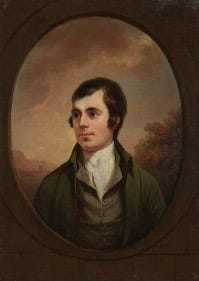“A Man’s a Man for a’ that”
An Essential, by Robert Burns
Robert Burns is widely considered Scotland’s national poet. Burns has also been widely beloved in United States, especially in the 19th century. Abraham Lincoln memorized many of his poems and, given the chance, would recite them to others.
Lincoln’s contemporary and frequent critic, the African American leader Frederick Douglass, addressing a “Burns Supper” in New York in 1849, told his audience that “I am not a Scotchman, and have a colored skin.” But if anyone in the audience might think him out of place on this occasion [and here Douglass points to a picture of Burns on the wall], “I beg that the blame may be laid at the door of him who taught me that ‘a man’s a man for a’ that.’”
The poet Walt Whitman, arguably the 19th century’s most important articulator of the American character and purpose, wrote that “Without the race of which he [Burns] is a distinct specimen, (and perhaps his poems) America and her powerful Democracy could not exist to-day—could not project with unparallel’d historic sway into the future.” He says that “one best part of Burns is the unquestionable proof he presents of the perennial existence among the laboring classes, especially farmers, of the finest latent poetical elements of their blood.”
Burns wrote the song “A Man’s a Man for a’ that” in 1795.
Is there, for honest poverty,
That hangs his head, an’ a’ that?
The coward slave, we pass him by,
We dare be poor for a’ that!
For a’ that, an’ a’ that,
Our toils obscure, and a’ that;
The rank is but the guinea’s [gold coin’s] stamp;
The Man’s the gowd [gold] for a’ that!
What tho’ on hamely [homely] fare we dine,
Wear hodden [rough] grey, an’ a’ that?
Gie [Give] fools their silks, and knaves their wine,
A man’s a Man for a’ that!
For a’ that, and a’ that,
Their tinsel show, and a’ that;
The honest man, tho’ e’er sae [ever so] poor,
Is King o’ men for a’ that.
Ye see yon birkie [fellow], ca’d [called] a lord,
Wha [What] struts, and stares, an’ a’ that?
Tho’ hundreds worship at his word,
He’s but a coof [dolt] for a’ that!
For a’ that, an’ a’ that,
His ribband, star, an’ a’ that,
The man of independent mind,
He looks and laughs at a’ that!
A prince can mak [make] a belted knight,
A marquis, duke, an’ a’ that;
But an honest man’s aboon [above] his might,
Guid [Good] faith, he mauna fa’ [mustn’t fault] that!
For a’ that, an’ a’ that,
Their dignities, and a’ that,
The pith o’ sense, an’ pride o’ worth,
Are higher rank than a’ that!
Then let us pray that come it may,
As come it will for a’ that;
That Sense and Worth, o’er a’ the earth,
May bear the gree [take the prize], an’ a’ that!
For a’ that, an’ a’ that,
It’s coming yet, for a’ that,
That Man to Man, the warld [world] o’er,
Shall brothers be for a’ that!
For a Contrasting View
Read the poem by Rudyard Kipling, “The Law of the Junge.” Both Burns and Kipling wrote poems and ballads. Both wrote in dialect. Both were enormously popular with the common people and less so with the critics. But they differed sharply in their outlook.
The Essentials
Civic Life aims to build a library of readings and other materials focusing on the meaning of citizenship for free and freedom-seeking people. “The Essentials” are those selections from contrasting perspectives deemed to be most indispensable to read, see, or hear on the topic.


